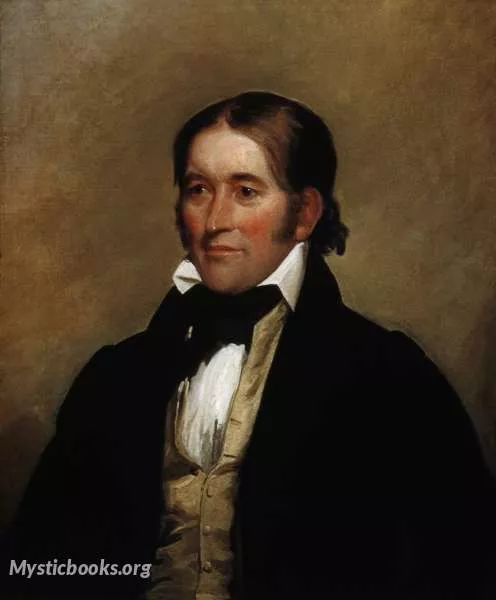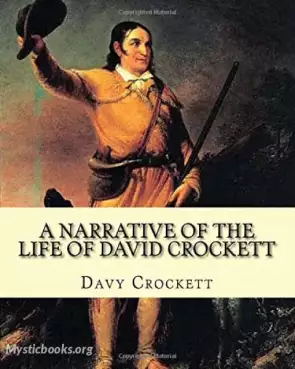
Timeline
Title
Country/Nationality
Davy Crockett
David Crockett was an American folk hero, frontiersman, soldier, and politician. He is commonly referred to in popular culture by the epithet "King of the Wild Frontier". He represented Tennessee in the U.S. House of Representatives and served in the Texas Revolution.
Crockett grew up in East Tennessee, where he gained a reputation for hunting and storytelling. He was made a colonel in the militia of Lawrence County, Tennessee and was elected to the Tennessee state legislature in 1821. In 1827, he was elected to the U.S. Congress where he vehemently opposed many of the policies of President Andrew Jackson, especially the Indian Removal Act. Crockett's opposition to Jackson's policies led to his defeat in the 1831 elections. He was re-elected in 1833, then narrowly lost in 1835, prompting his angry departure to Texas (then the Mexican state of Tejas) shortly thereafter. In early 1836, he took part in the Texas Revolution and was likely executed at the Battle of the Alamo after being captured by the Mexican Army.
Crockett became famous during his lifetime for larger-than-life exploits popularized by stage plays and almanacs. After his death, he continued to be credited with acts of mythical proportion. These led in the 20th century to television and film portrayals, and he became one of the best-known American folk heroes.
David Crockett was born in eastern Tennessee on August 17, 1786, one of nine children of pioneer parents John and Rebecca (Hawkins) Crockett. John struggled to make ends meet, and the family moved several times throughout Crockett’s childhood. Davy was often hired out to help pay his family’s debts.
Crockett received no significant academic education. For much of his teenage life, his teacher was the frontier, where he became a skilled woodsman, scout and hunter.
In 1813, Crockett joined the Tennessee militia as a scout and fought against the Creek Indians in Alabama. He participated in the Indian massacre at Tallushatchee in retaliation for an Indian attack on Fort Mims.
During the War of 1812, Crockett re-enlisted as Third Sergeant under Captain John Cowan. He went to Spanish Florida to help Andrew Jackson clear British forces, including British-trained Indians, from the region.
After being discharged in 1815, he returned home, where his wife Polly soon died. He remarried, moved his family to Lawrence County, Tennessee, started several businesses and began his political career.
In 1817, Crockett became public commissioner of Lawrence County. Later that year, he was elected justice of the peace and then became a lieutenant colonel in the Tennessee militia. After resigning those posts, he won a seat in the Tennessee General Assembly representing Lawrence and Hickman counties, where he fought for the tax and land rights of poor settlers and refined his speaking skills.
After losing his businesses to flooding, Davy moved to Carroll County and was again elected to the General Assembly in 1823. He lost a bid for Congress in 1825 and returned to the private sector.
He ran for Congress again in 1827 and 1829 and won a seat in the U.S. House of Representatives, lost in 1830, won again in 1833 and lost his final bid in 1834. He often opposed President Andrew Jackson’s political platform, although at first, he supported him.
While in Congress, Crockett made a name for himself as a gifted storyteller and the “gentleman from the cane,” a snobbish reference to his rural upbringing. He also became the subject of a play and a series of books and almanacs which included tall tales about his exploits as a bear-hunting frontiersman.
Hoping to set the record straight about the reality of his life and change his folk hero reputation, Crockett wrote an autobiography and went on tour promoting it. When he returned and lost his seat in Congress, he famously said, “I told the people of my district that I would serve them faithfully as I had done; but if not, they might go to hell, and I will go to Texas.” And he did.
Crockett and a 30-man armed brigade arrived in Nacogdoches, Texas, in January 1836 during the Texas War for Independence. Crockett swore allegiance to the Provisional Government of Texas in exchange for land and arrived in San Antonio at the Alamo Mission in February.
On February 23, President General Santa Anna and thousands of his troops laid siege to the Alamo against no more than 200 Texas volunteer soldiers, including Crockett and his men, whose sharpshooting skills and long rifles proved invaluable in the fight.
Despite Texas commander Sam Houston’s advice to abandon San Antonio, the Alamo defenders dug in and held out for 13 days until Mexican soldiers overran their defenses on March 6 and killed them all.
Crockett is thought to have died defending the Alamo; however, by some accounts he survived the battle and was taken hostage with a handful of men (against Santa Anna’s orders to take no hostages) and executed.
Crockett’s death at the Battle of the Alamo burnished his reputation as a hero and cemented his legendary status.
Books by Davy Crockett

A Narrative of the Life of David Crockett, Written by Himself
Autobiography, written by David (Davey) Crockett about 2 years before his death at the Alamo in March of 1836.

Narrative of The Life of David Crockett of The State of Tennessee
Step into the wild and untamed frontier with David Crockett, the legendary hunter, frontiersman, and politician, as he recounts his extraordinary life in his captivating autobiography, "Narrative of the Life of David Crockett of the State of Tennesse...